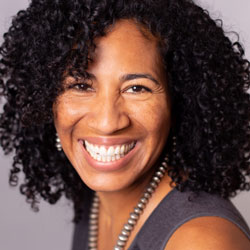 For Mona Scott-Figueroa, 2021 offers not only the chance for a widely inclusive look at the world of Black Americans but a way to honor those who have helped achieve progress in an extraordinarily challenging environment.
For Mona Scott-Figueroa, 2021 offers not only the chance for a widely inclusive look at the world of Black Americans but a way to honor those who have helped achieve progress in an extraordinarily challenging environment.
She is among those who spearheaded creation of Black History 2021—A Year of Recognition at Mesa Community College.
“This Year of Recognition explores the impact Black Americans have made in areas such as our local community, entrepreneurship, education, film and arts, politics and law, and much more,” said Figueroa, a member of the American Indian Studies and Sociology faculty at MCC.
She also serves as Phi Theta Kappa adviser and Black History Year Committee member.

As to her overview of progress that has been made so far this year, Figueroa says she is thankful for an opportunity to relate some of the successes.
“We are sharing the accomplishments of our Black colleagues who excel in their area of expertise and have advanced diversity, equity and inclusion at MCC,” she said.
Scott-Figueroa is Táchii’nii born for Naahiłí (African Americans). Her maternal grandfather is ‘Áshįįhi and her paternal grandfather is Naahiłí. She is from Birdsprings on the Navajo Nation.
Her teaching and research background include Indigenous epistemologies, as well as Ainequalities and power with an emphasis on race and ethnicity. She draws heavily from life experiences growing up in South Central Los Angeles, in Birdsprings, and in Winslow.
MCC extended February’s Black History Month into the year-long observance Black History 2021—A Year of Recognition, during which it will honor the achievements of Black people past and present by hosting events featuring their history and culture.
The special program further acknowledges and teaches others about historical and modern injustices,” said Tricia White, director of the MCC Office of Institutional Effectiveness and Black History Year Committee member.
“We hope, by continuing the momentum launched in February during Black History Month, to engage with our students and our community to identify ways we can move forward, together,” White said.
Until the observance concludes in December, Tempe and West Chandler residents are being encouraged to participate in various events and programs, and to review the resources and features found online at mesacc.edu/black-history-year.
A monthly online resource, Faculty Spotlights, features employees from several areas within the college: Michelle Traveler, Ph.D., MBA from the Computer and Information Systems Department; Luis Ellis, a doctoral candidate at Fielding Graduate University, from Student Success Programs; Anthony Griffith, Ph.D. from the Reading Department; and Sheba Jones from the Dental Hygiene Department.
Recordings also are available of virtual Black History Month events, including Community Resilience: Queer. Black. Trans., facilitated by Monic Jones, BSW, executive director of the Outlaw Project; and Where do we go from here: Chaos? Or Community?, led by Richard Crews.
All are available on demand at mesacc.edu/black-history-year.

